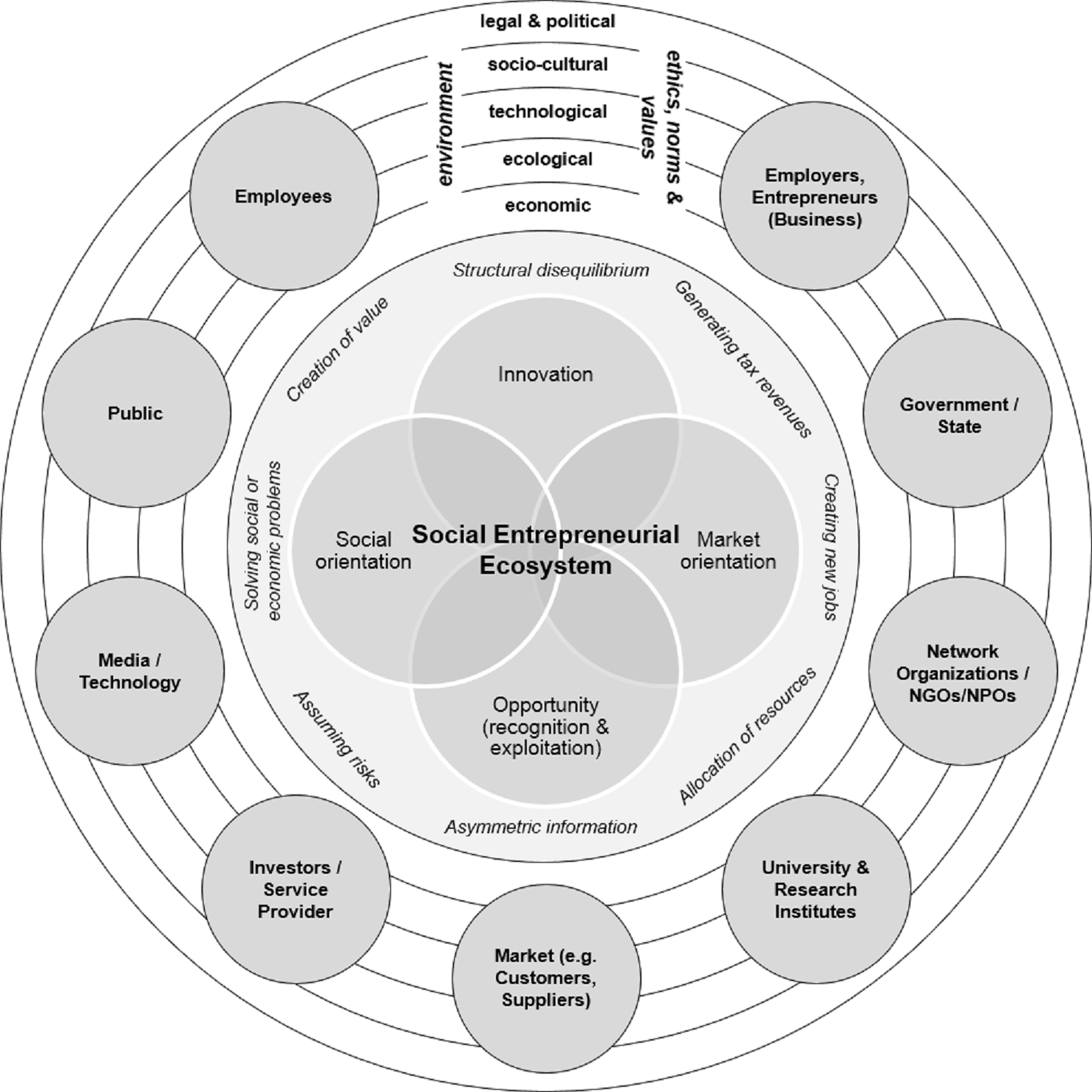
The scarcity of natural resources, the rapid increase of world population growth, extreme poverty, a widening middle class in emerging markets, and the negative impact of climate change are considered to be some of the greatest challenges we face today.
In fact, they are said to be so important that the United Nations set the development of solutions to these challenges as a number one priority within its Millennium Development Goals (MDG).
However, multi-national corporations lack the ability (and motivation) – for various reasons – to solve the issues that modern society faces.
Previously, companies have attempted to tackle large societal issues with public services, corporate social responsibility (CSR) programs or charities, but these efforts have proved to be insufficient.
In fact, some companies abused their approaches to the extent that it made CSR sound like a cliché. Needless to say, charity organizations, foundations, and well-establish multinationals are not able to fully combat issues that plague humanity.
Bloomberg science reporter Eric Roston summarized the problem in a simple tweet.
Slogan slogan jargon cliche slogan corporate social responsibility jargon: Empty Signifier. #CSR
— Eric Roston (@eroston) June 11, 2015
Numerous experts from around the globe and various fields – including business, policy-making, and academia – urge for a new approach. And this is where social entrepreneurship comes into play.
An inside look at social entrepreneurship
Social entrepreneurship addresses a need that has not yet been addressed by large institutions. “The current financial crisis and its global consequences have increased the need to position social questions at the heart of the global economy,” says Alain Fayolle, professor of Entrepreneurship at EMLYON Business School. “The main goal of social entrepreneurship is to address the need, or demand, that has not yet been addressed by the state or the commercial sector.”

“When a community gets access to clean water, it can change just about everything. It can improve health, increase access to food, grow local economies, and help kids spend more time in school.” – Charitywater.org
Social entrepreneurs aim to address societal problems and provide innovative solutions using market mechanisms. The academic world understands the importance and potential impact of their efforts. For example, EMLYON Business School offers an international entrepreneurship program, which includes social entrepreneurship as one of the four main pillars of entrepreneurship.
So, what is social entrepreneurship really about?
In general, a social enterprise is distinguished by its societal mission that leads with “impact first” as their primary message. Yet, in comparison to charities, it has a distinctive approach to making a social impact in a financially viable manner.
Social entrepreneurship (also known as sustainopreneurship or sustainable entrepreneurship) is a concept of applying business techniques and private sector practices to solve social, cultural, or environmental problems.
In his book, Handbook of Research on Social Entrepreneurship, Professor of Entrepreneurship, EMLYON Business School, Alain Fayolle states that “social entrepreneurship aims to better accommodate a social dimension within the traditional economic behavior, to take into consideration social problems, countries and communities contexts and situations, and the plight of socially challenged or disadvantaged individuals.”

The concept of social entrepreneurship can be applied to a variety of organizations of different sizes, aims, and beliefs. It is assumed that a social entrepreneur has a purpose that goes beyond making money — it needs to have a social cause. This cause is measured by the scale of the potential positive impact an organization can as a result of its activities.
According to an EY Social Entrepreneurship publication there are key characteristics that make a social venture different from a traditional business. A social enterprise:
-
Creates a positive impact on society (socially or environmentally);
-
Realizes its primary objective by delivering a service or product as an independent organization;
-
Is financially self-sustainable and therefore does not depend on donations and subsidies.
Additionally, it runs its business in a sustainable way:
-
Profit is allowed, however, the financial goals are supportive of the company’s societal mission;
-
Scalability of the business model increases the level of impact;
-
Dividends paid to shareholders are reasonable;
-
Governance and policies are based on equal voting rights for all parties involved;
-
Fair to everyone;
-
Environmentally conscious;
-
Transparent.
Yet there is still cause for confusions as to what is classified as social entrepreneurship and what is not. Most notably, the confusion arises when charities and charitable foundations are called social entrepreneurs, yet it is counter-intuitive with the rise of charitable for-profit entities.
Ashoka, the largest network of social entrepreneurs worldwide, offers a list of historical examples of leading social entrepreneurs that include:
-
Vinoba Bhave (India): Founder and leader of the Land Gift Movement, he caused the redistribution of more than 7,000,000 acres of land to aid India’s untouchables and landless.
-
Dr. Maria Montessori (Italy): Developed the Montessori approach to early childhood education.
-
Florence Nightingale (U.K.): Founder of modern nursing, she established the first school for nurses and fought to improve hospital conditions.
-
Jean Monnet (France): Responsible for the reconstruction of the French economy following World War II, including the establishment of the European Coal and Steel Community (ECSC). The ECSC and the European Common Market were direct predecessors of the European Union.
Top 3 social entrepreneurship trends in 2016
Even though the definition of social entrepreneurship is up for much debate, there is no doubt that a social cause reinforced by commercial activity will become more common among new and established social ventures.
Social entrepreneurship has hit mainstream.
For example, at the World Economic Forum in Davos, Switzerland (where the most influential leaders from corporate, political and academic worlds meet to discuss the next trends) social entrepreneurship has taken on a separate and honorable role.
1. Social entrepreneurship will continue its uptick
Ryan Little, Project Manager at the BMW Foundation, and co-founder of the Canadian charitable platform, CanadaHelps, suggests that social entrepreneurship is becoming more like mainstream entrepreneurship, and that’s a good thing. Over the next five to ten years, we can expect a shift in the way social enterprises are funded.
“On the most basic level, there’s something inherently interesting and appealing about entrepreneurs and the stories of why and how they do what they do,” according to the Stanford Social Innovation Review (SSIR).
“But interest in social entrepreneurship transcends the phenomenon of popularity and fascination with people. Social entrepreneurship signals the imperative to drive social change, and it is that potential payoff, with its lasting, transformational benefit to society, that sets the field and its practitioners apart.”
2. Social entrepreneurship will benefit from an improved ecosystem
As the discussion of social entrepreneurship moves deeper into mainstream there will be an improved availability of services to help social entrepreneurs succeed. We can also expect that organizations and professionals supporting social entrepreneurs will improve their academic methods and resources.

This trend is already emerging as more graduate programs roll out social innovation and social entrepreneurship programs to meet increasing demand. “Social entrepreneurship is growing in investment and global interest, so this developing sector needs talented individuals motivated to solve social problems, who have the ability to turn an idea into a profitable, sustainable long-term business venture.”
3. Social entrepreneurs can expect rise in connectivity
Social entrepreneurs have always craved for connections with each other and recently that tipping point has been met.
Networks and organizations supporting early stage social entrepreneurs will increase in coming years to support the growing need for quality support; fueling a high-impact social entrepreneurship ecosystem.
“Global institutions such as Ashoka, Groupe SOS, Skoll World Forum, Stanford Center on Philanthropy and Civil Society, Social Capital Markets (SOCAP), Sankalp Forum, and Santa Clara University’s own Miller Center and Global Social Benefit Institute (GSBI) have spent much of the last decades defining, supporting, and nurturing the emerging space for social entrepreneurship.”
Connected communities will increase capabilities as the sharing of best practices and support. Scrappy social entrepreneurs with big social missions will benefit from a more robust network of people, resources, and ideas to increase scale and sustainability.
How millennials perceive social entrepreneurship
As Millennials (a.k.a., Generation Y – a term that applies to those “anywhere from the mid-1970s when the oldest were born to the mid-2000s when the youngest were.”) enter the labor force and start new companies worldwide, they are reshaping the global economy.
Why is this important?
Millennials represent the largest batch in the past 5 decades to join the global markets, which will inevitably change the way how business is conducted. And despite the fact that millennials are joining the market at the toughest time in the past 100 years, a recent Nielsen global online study found that they continue to be most willing to pay extra for sustainable offerings.
Ultimately, “social entrepreneurship is the next generation’s secret weapon for tackling chronic social challenges and creating the change they want to see.” It begs the question: What change do you want to see in the world?
This article has been edited and condensed.
Arthur Gopak is an entrepreneur, business consultant, finance enthusiast, and editor-in-chief at AlphaGamma. Has a MSc degree in Finance and a BSc degree in Business Administration. He is passionate about digital media, content marketing and financial innovation. In his spare time, Arthur enjoys composing music, active leisure and building things. Connect with @AlphaGammaHQ on Twitter.
© YFS Magazine. All Rights Reserved. Copying prohibited. All material is protected by U.S. and international copyright laws. Unauthorized reproduction or distribution of this material is prohibited. Sharing of this material under Attribution-NonCommercial-NoDerivatives 4.0 International terms, listed here, is permitted.





